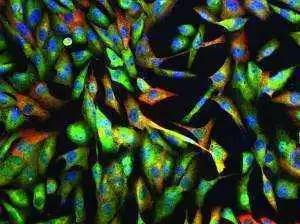.webp.3465cae83db1e99c7306278f84d6b5d5.webp)
Celiac.com 11/01/2012 - Although most instances of gluten sensitivity manifest as a chronic, autoimmune disorder of the small intestine (celiac disease), around 10% of gluten sensitive patients suffer neurological symptoms. Usually these neurological symptoms accompany the more common intestinal issues, but some patients exhibit neurological symptoms exclusively. For this reason, it is thought that gluten-related symptoms in different parts of the body could be the result of autoimmune reactions to different members of the transglutaminase gene family. A recent lab study suggests that neurological gluten-related symptoms could be the result of an immune reaction to a particular neuronal enzyme known as TG6, and that this reaction occurs separate from other autoimmune reactions to gluten.
 Sera were collected from 6 groups: 20 newly diagnosed celiac disease patients (pre gluten-free diet) with no neurological symptoms, 34 gluten ataxia patients who tested positive for anti-gliadin antibodies, 17 peripheral idiopathic neuropathy patients, also positive for anti-gliadin antibodies, a control group of 18 genetic (non-gluten related) ataxia patients or individuals with clear family history of ataxia, a second control group of 14 patients with various immune-mediated but gluten-unrelated diseases and a third control group of 19 healthy individuals. Sera were tested through a series of protein analyses and enzyme-linked immunosorbent assays.
Sera were collected from 6 groups: 20 newly diagnosed celiac disease patients (pre gluten-free diet) with no neurological symptoms, 34 gluten ataxia patients who tested positive for anti-gliadin antibodies, 17 peripheral idiopathic neuropathy patients, also positive for anti-gliadin antibodies, a control group of 18 genetic (non-gluten related) ataxia patients or individuals with clear family history of ataxia, a second control group of 14 patients with various immune-mediated but gluten-unrelated diseases and a third control group of 19 healthy individuals. Sera were tested through a series of protein analyses and enzyme-linked immunosorbent assays.
Celiac.com Sponsor (A12):
In the celiac disease group, 18 of 20 patients tested positive for the TG2 autoantibody, with the remaining two testing postive for the TG3 or TG6 autoantibodies. 55% of celiac disease patients had multiple transglutaminase autoantibodies: 45% of all celiac disease patients had antibodies for both TG2 and TG3, 45% had antibodies for both TG2 and TG6, and 35% had antibodies for TG2, TG3 and TG6.
Gluten ataxia patients were separated into two groups: those with intestinal symptoms (group GAE), and those without (group GAo). TG2 autoantibodies correlated well with intestinal symptoms: 12 of 15 in the GAE group tested positive for TG2 autoantibodies, while only 1 of 19 in the GAo group tested positive for them. TG3 autoantibody results were similar: group GAE results were comparable to the celiac disease group, while group GAo was no different from the control groups. In contrast, both gluten ataxia groups had similar results for TG6 autoantibodies. Overall prevalence of TG6 autoantibodies in the gluten ataxia group was 62%, compared to 45% in the celiac disease group.
Inhibition studies showed that in group GAE (gluten ataxia with intestinal symptoms), autoantibodies reacted separately from one another, with TG2 and TG6 autoantibodies reacting independently of one another to their respective TG isozymes. This, along with the fact that some patients tested positive exclusively for TG6 would suggest that intestinal and neurological gluten-related symptoms are caused by separate immune reactions to different TG isozymes (TG2 and TG6, respectively). This is further supported by postmorten analysis of a gluten ataxia patient without intestinal symptoms, where TG6 deposits were found in the brain (TG6 could not be detected in a normal cerebellum).
The findings of this study suggest that with more research, doctors may have another diagnostic tool in the form of TG6 autoantibody tests. This would help determine which patients with gluten sensitivity might be most at risk for developing neurological symptoms.
Source:
- Open Original Shared Link








Recommended Comments